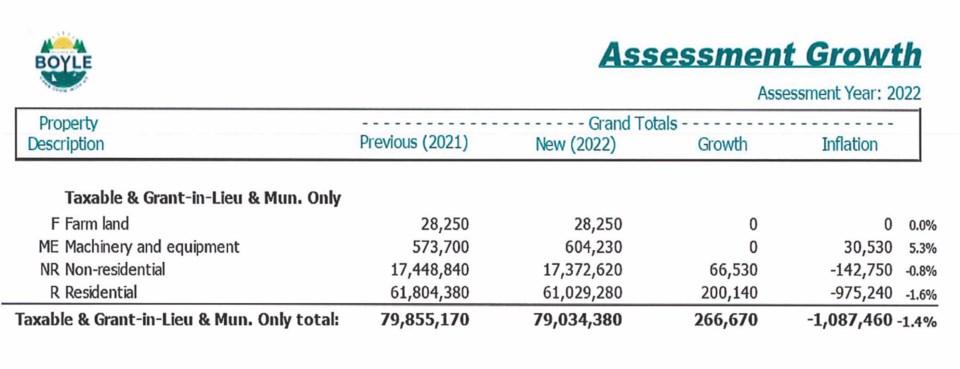BOYLE – After a yearly assessment that saw the residential properties fall in value, Village of Boyle councillors welcomed their assessor, Dan Kanuka, for a presentation on the ins and outs of what the assessment process looks like.
Councillors voted 5-0 to accept the presentation as information during the May 17 meeting, which included information on the current assessment value of the village.
In Boyle, residential properties fell from $61,804,380 to $61,029,280, as part of an overall decrease in value of $1,087,460, or 1.4 per cent.
During his presentation, Kanuka talked about new methods that he and his colleagues were able to use to determine assessment, including information from the Edmonton Real Estate Board which they can use to confirm data.
Under a new agreement, Municipal Assessment Services Group Inc., the company that Kanuka works for, can use data from the real estate board, and a GIS provider to access all the sales data that exists within in the village.
Say a house gets assessed at $100,000 but ends up selling for $150,000. Kanuka says his assessment is supposed to be within five per cent of the market value, so they would be able to look at the information from the sale and see if a basement had been renovated.
Previously, the assessors would have been limited to development permits, which aren’t always requested for an internal renovation.
One of the questions asked by Coun. Shelby Kiteley was around housing shortages; what do the assessors do to ensure that their valuations are accurate to the market value, and not artificially inflated by a short-term housing shortage?
Kanuka said that they use longer-term data, going back three years to get a feel for the historical trends, which can help eliminate short term volatility. Another safeguard is the submission to the province; the assessor’s work has to pass multiple tests designed to ensure that they aren’t “sales chasing”, according to Kanuka.
Mayor Colin Derko also had questions for Kanuka, but a big one was around an event that the village had dealt with earlier; before buying a property, an individual had reached out to the village to ask about taxes, but the property sold for more than the assessed value, which changed the values. Derko wanted to know if this was common, and how individual sales impacted this.
“We analyze every sale that takes place,” said Kanuka. “When I get the sale from Alberta Land Titles, I research the documents that are signed at the lawyer’s office, to make sure that it’s an actual arms-length transaction. Auction sales are often not a good indicator of a properties actual value. I believe I know the property that you’re talking about, and the new owner stated that he had paid more than it was worth, but he got caught up in the bidding process. That sale (and others like it) aren’t used in our analysis.”



